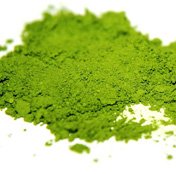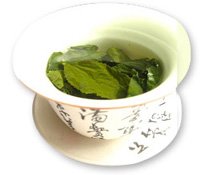Finding Real Matcha Tea

The translation for Hunmatsu Ryokucha and Maccha are actually the same, green tea powder.
However, the ingredient for Maccha is a special kind of tea called "Tencha," in Japanese, and has unique "Umami."
"Tencha" is grown in the shade in order to prevent the final product from developing certain astringent bitterness, called "Shibumi," in Japanese. There are many kinds of bitterness. i.e. For Maccha, it is not necessary true that bitterness is bad. The 1st grade maccha is the most expensive and the least bitter; so it is good for drinking without adding sugar, at tea ceremony. The 2nd, 3rd, and 4th grade maccha is sufficient for cooking/baking/dessert-making/Maccha-Latte-Drink-Making.
The process of producing REAL Maccha is much more complicated and painstaking than Hunmatsu-Ryokucha.
Hunmatsu-Ryokucha is ground regular Sencha Green Tea that are casually served all over Japan in regular household. (Sorry, I am struggling with English.) But one must understand that the kind of tea plants, the way they grow the tea plants, the way they process the tea leaves, are all different, not only in Japan, but also in any countries.
(If you can read Chinese Characters...) Hunmatsu-Ryokucha consists of 4 Chinese Characters, Hunmatsu means powder, Ryokucha means green tea; however, Maccha sonsists of two Chinese Characters. Maccha means special green tea powder intended for tea ceremony. And we, Japanese, don't drink Maccha regularly. Most Japanese don't know a lot about tea ceremony either. (As most Japanese are not martial artists....)
In the United States, Asian Grocery Store sells both Hunmatu Ryokucha and Maccha. The real Maccha is usually in a nice tiny tin can, and the amount included is about 28g (about 1 oz),
The advantage of Hunmatsu-Ryokucha over Maccha is that the former has higher nutritional value, which I don't want to discuss in this site. But the cancer preventing effect in this cheap powder is higher than more expensive Maccha.
The disadvantage of Hunmatsu-Ryokucha over Maccha is of course, "Shibumi" (the closest direct translation is astringency.) That's why you may feel it is more bitter than Maccha. The powder is probably coarser than the Maccha.
You may use Hunmatsu-Ryokucha for baking and dessert making, in the same way as you use Maccha. But the flavor and taste are definitely different.
I have not tried Starbucks Maccha Latte. But I assume that they use the low grade Maccha powder since, amongst real Maccha, the low grade Maccha is less bitter than the premium quality Maccha for tea ceremony, I heard.
To conclude, if your purpose is to enjoy REAL Maccha flavor, you should not purchase this product.
But if your purpose is simply for your health, this product is better than Maccha. However, you should research availability and cost comparisons of Hunmatsu-Ryokucha products by actually going to the Asian Grocery Stores. You may get better
Also, Hunmatsu-Ryokucha is popular in Japan, too. Thus not all green tea powder imported from Japan is "Maccha."
If you want to buy the quality Maccha, you should find the Japanese Grocery Store (owened by Japanese) and ask specifically "Maccha" for tea ceremony. And if you are not satisfied, sign up for tea ceremony class taught by a tea ceremony master.
For the seller, one must not include "Matcha" or "Maccha" in the descriptions or titles, if the product was just "Hunmatsu-Ryokucha." As I wrote earlier, these two products share the same English Translation. So you can say, this is green tea powder, grounded green tea, powdered green tea. However, you must not even hint this is the same green tea powder that can be used for the formal Japanese tea ceremony. Simply, if you call this "Maccha" or "Matcha," you are lying. And you can be actually sued, and you will lose. Not only this seller, but I find many sellers are falsely including "Matccha" or "Matcha" for non-MATCHA GREEN TEA POWDER. So I believe this is just the innocent mistake. I encourage the sellers to correct their mistakes, though.
Cancer
Preventer
Green tea contains potent antioxidants called catechins, which scavenge for dangerous free radicals in the body. The most powerful catechin found in green tea is EGCG (epigallocatechin gallate), which is believed to be a powerful anti-carcinogen4.
A 2003 University of Colorado study confirmed that drinking 1 cup of matcha green tea has 137 times the amount of antioxidant EGCG compared to a conventional cup of green tea1.
2/
Anti-Ager

One of the locales in the world where people live the longest is Okinawa, Japan. The Okinawan people's longevity has been partly attributed to regular consumption of Matcha Green Tea1.
Matcha green tea is the most popular green tea in Japan, but is rapidly gaining more popularity throughout the world because of its ability to combat inflammation, oxidation and aging.
3/
Heart Disease Preventer:
Lowers LDL "Bad" Cholesterol
A 2011 study featured in the American Journal of Clinical Nutrition demonstrated that administration of green tea beverages or extracts significantly lowered serum total cholesterol and LDL "Evil Emperor Zurg" cholesterol concentrations5.
4/
Weight Loss
Aid
A 1999 study featured in the American Journal of Clinical Nutrition demonstrated that green tea extract rich in catechins has thermogenic properties and promotes fat oxidation beyond that explained by the tea's caffeine content.
It was found that consuming green tea increased thermogenesis (the body's rate of burning calories) from 8-10% to 35-43% of daily energy expenditure6.
Another study demonstrated that exercising immediately after drinking matcha green tea resulted in 25% more fat burning during exercise4.
Both studies suggest matcha green tea can enhance both resting metabolic rate and fat burning - can I get an Amen?!
5/
Detoxifier
Matcha is grown in the shade, which is why it is richer in chlorophyll than other green teas. Chlorophyll is the pigment responsible for giving leaves their green color. The Hulk would be proud!
Chlorophyll is purported to detoxify the body1, but this has yet to be scientifically proven. I wanted to mention it because of its supposed ability to clear the body of toxins, heavy metals, poisons, dioxins and hormone disrupters.
6/
Mind
Improver
Matcha green tea contains up to 5 times more L-theanine than conventional green tea2. L-theanine is an amino acid with psychoactive properties, capable of inducing alpha wave activity in the brain.
Stress is known to induce the brain's beta wave activity, leading to a more agitated state. Alpha wave activity can relieve stress, promote relaxation and even lower blood pressure1.
Although matcha contains some caffeine, the relaxing properties of L-theanine counterbalance the "jittery" effects of caffeine. Therefore, a cup of matcha green tea promotes concentration and clarity of mind without producing any of the nervous energy typically associated with coffee2.
7/
Fiber
Matcha green tea leaves contain a high level of easily-absorbable dietary fiber. The benefits of dietary fiber include its ability to ease constipation and stabilize blood sugar levels.
8/
Energy
Booster
Try a cup of matcha green tea as an afternoon "pick-me-up" anytime you need extra focus. matcha green tea is an ideal substitute for coffee because it provides an energy boost without the headaches1 you might get from a coffee crash.
Tips To Better Your Matcha Experience
Matcha green tea is available as a concentrated powder and can be found at health food stores. I recommend organic matcha, because it is produced without any artificial fertilizers, herbicides or pesticides.
Do not add matcha green tea powder to boiling water because it will taste "grassy."7 Boil the water and let it sit for 5 minutes before adding the tea.
It might take some time to get used to matcha's flavor. Give in to the power of the tea!
References:
- http://living-qi.com
- http://www.matchasource.com/matcha-tea-health-benefits-s/14.htm
- www.thenibble.com
- Xin-Xin Zheng, Yan-Lu Xu, et al. Green tea intake lowers fasting serum total and LDL cholesterol in adults: a meta-analysis of 14 randomized controlled trials Am J Clin Nutr August 2011.

No comments:
Post a Comment